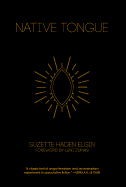
Native Tongue focuses on the power of women's collective action in a world designed to make women second-tier citizens. Originally published in 1984--prior to The Handmaid's Tale and other dystopian novels of its ilk--Suzette Haden Elgin's novel opens in an imagined American future in which women have been stripped of any and all rights, forbidden to vote, work outside the home without a man's permission or make virtually any choices for themselves. Fast-forward from these extreme rollbacks of women's rights to the 23rd century, when mankind (specifically mankind) has made contact with various alien species. A small group of isolated "linguists," known to breed children raised to be perfect alien translators, are called upon to handle negotiations with these foreign entities.
There's a lot to take in as Native Tongue unfolds, and Elgin's worldbuilding can be confusing at first. But with patience, this backdrop becomes the perfect setting for Elgin's true story: that of a group of women creating a language of their own, meant to take back not only their identities in the present but also their futures. The first in a trilogy (all three of which have been reissued by the Feminist Press simultaneously), Native Tongue is a dystopian novel about women's rights. But it is also an exploration of the role of language in shaping identity and vice versa--and the shocking lengths mankind, with an emphasis on man, will go to understand that role. --Kerry McHugh, blogger at Entomology of a Bookworm

